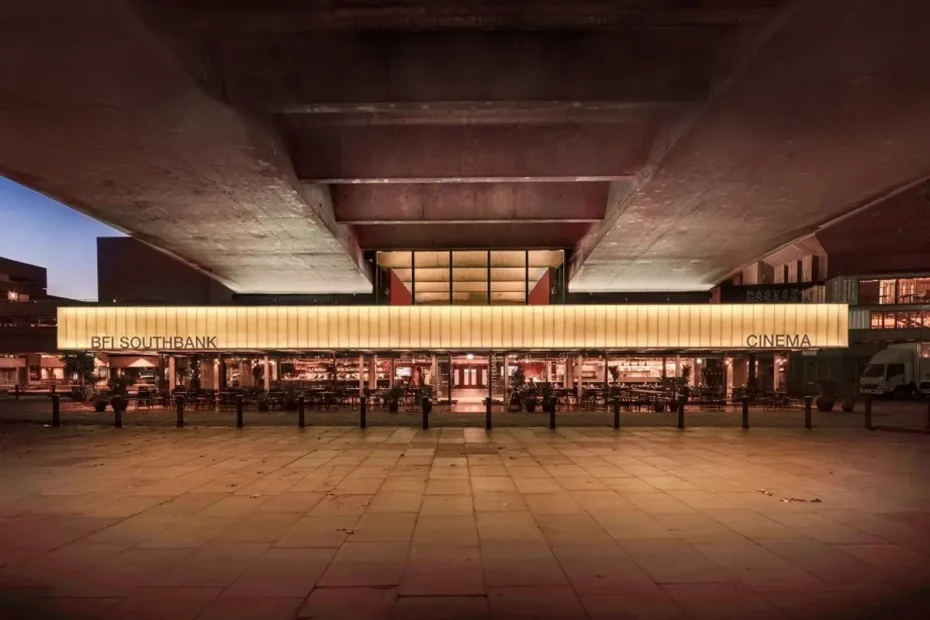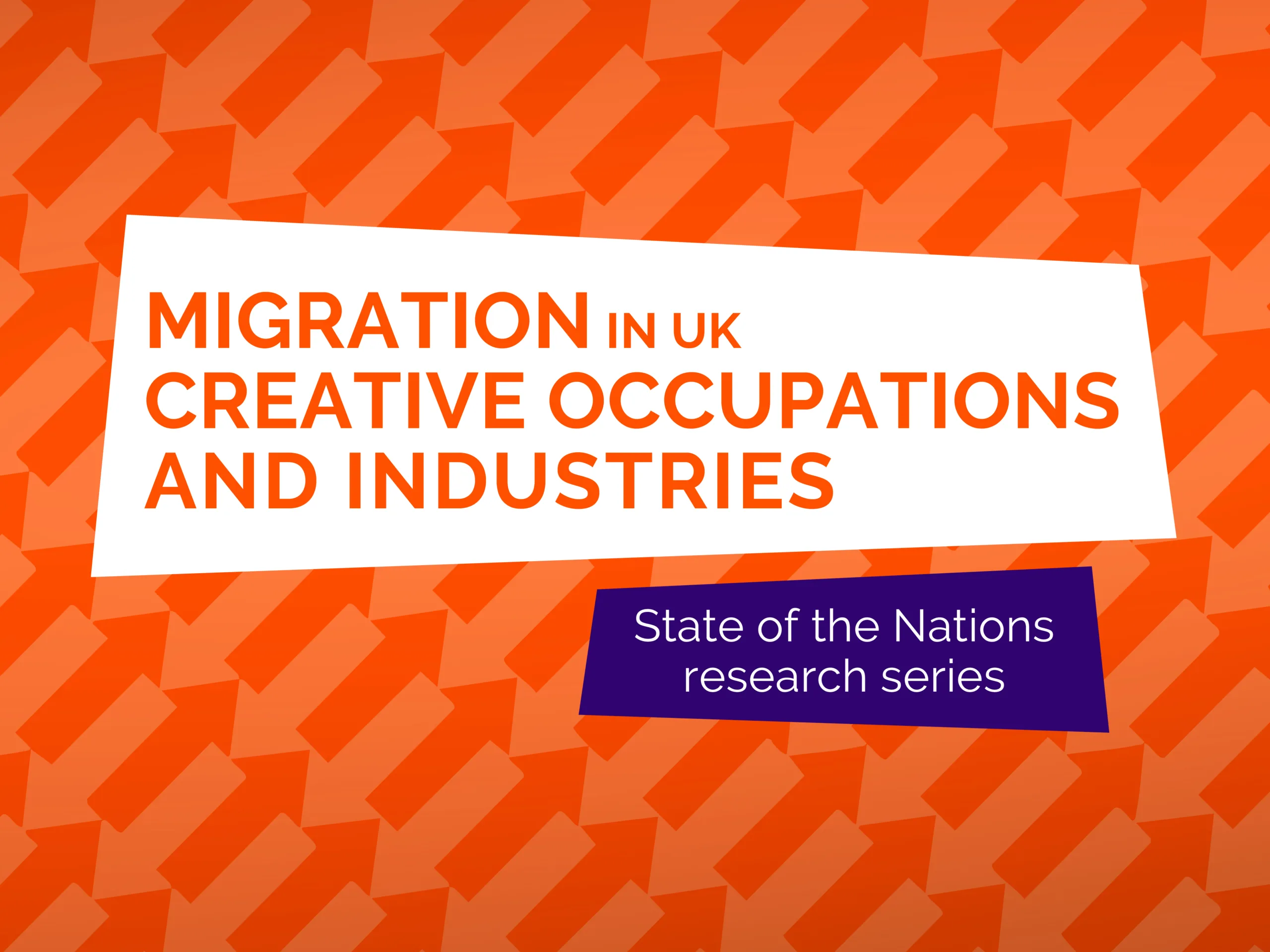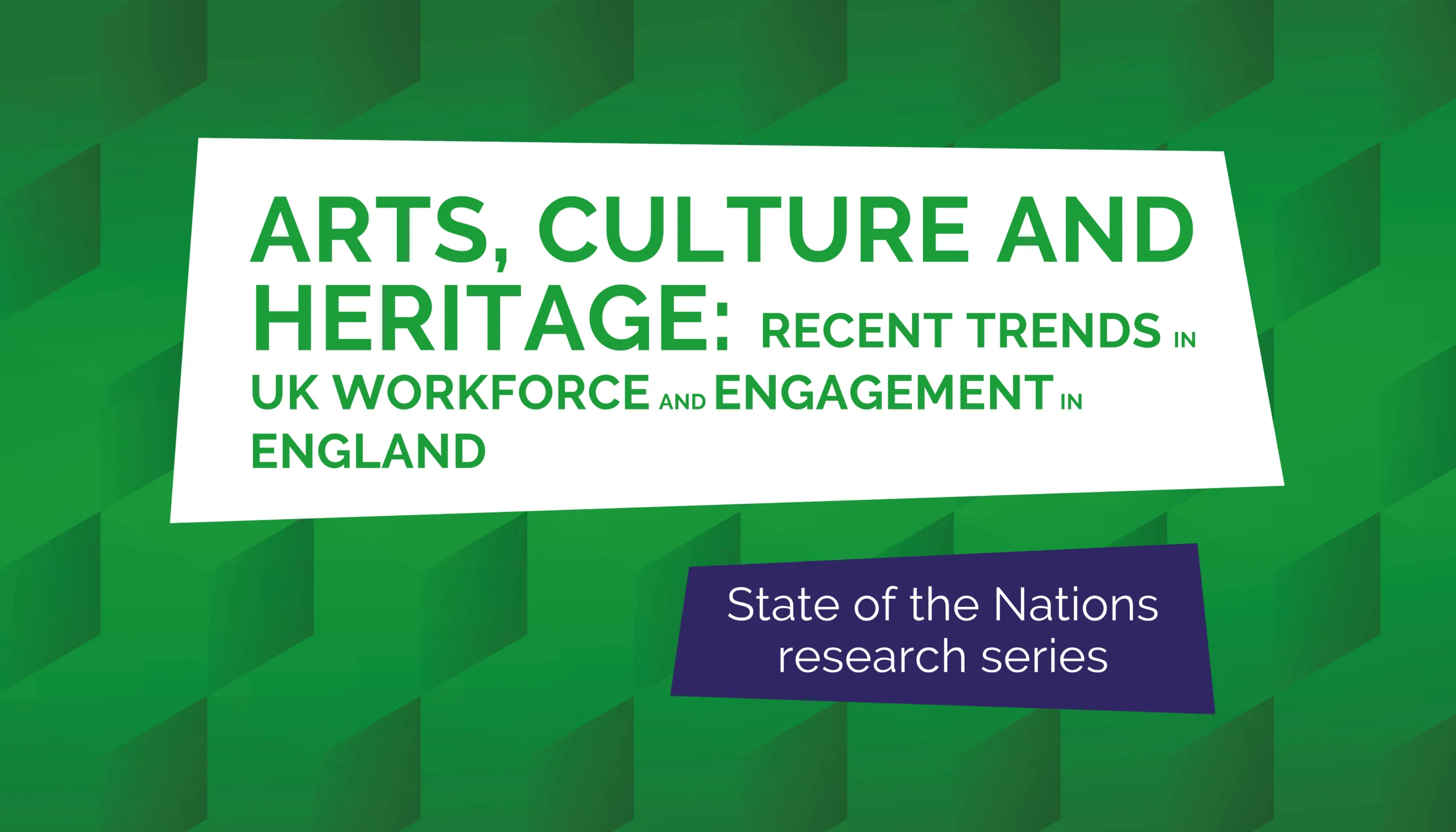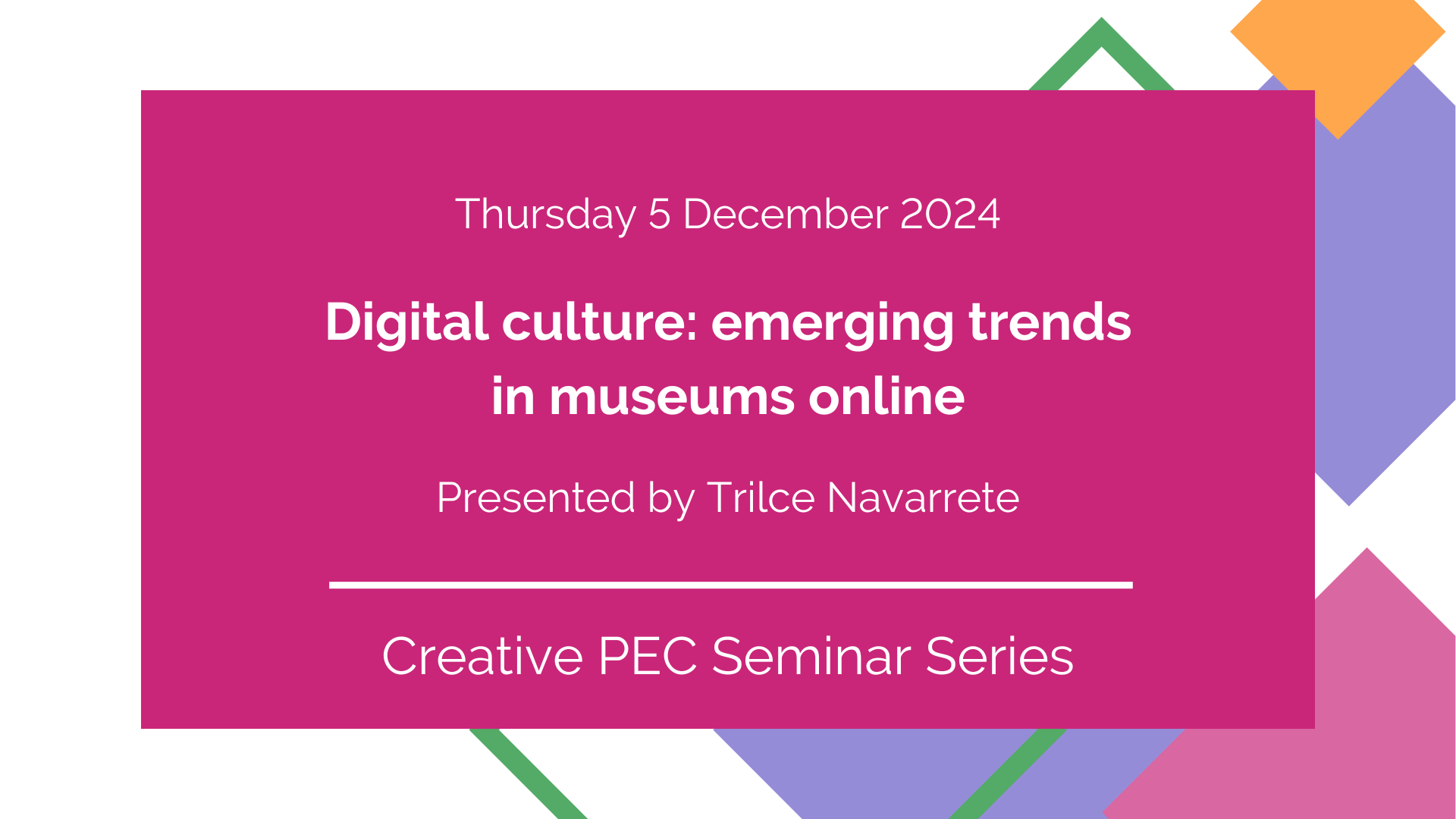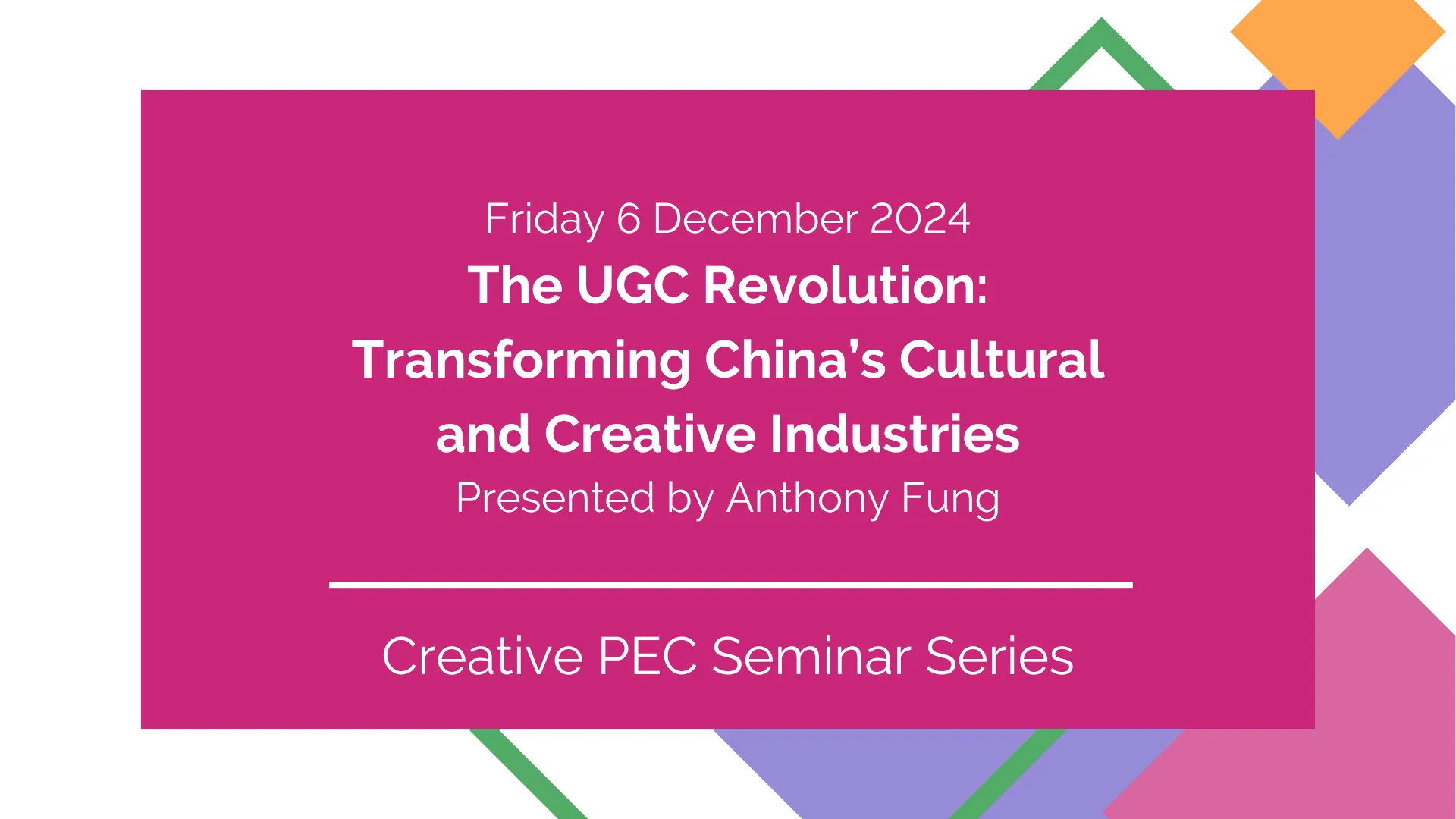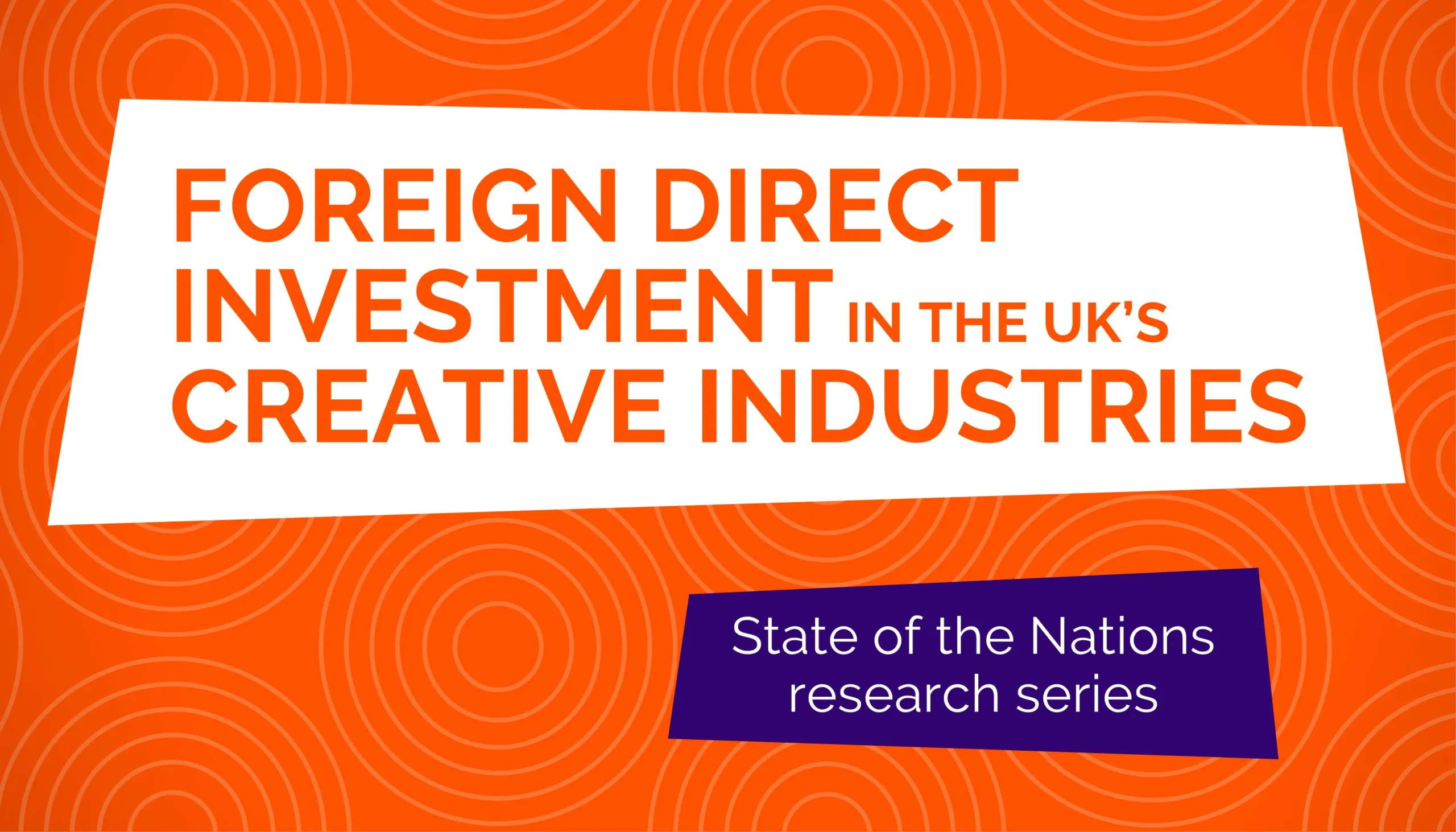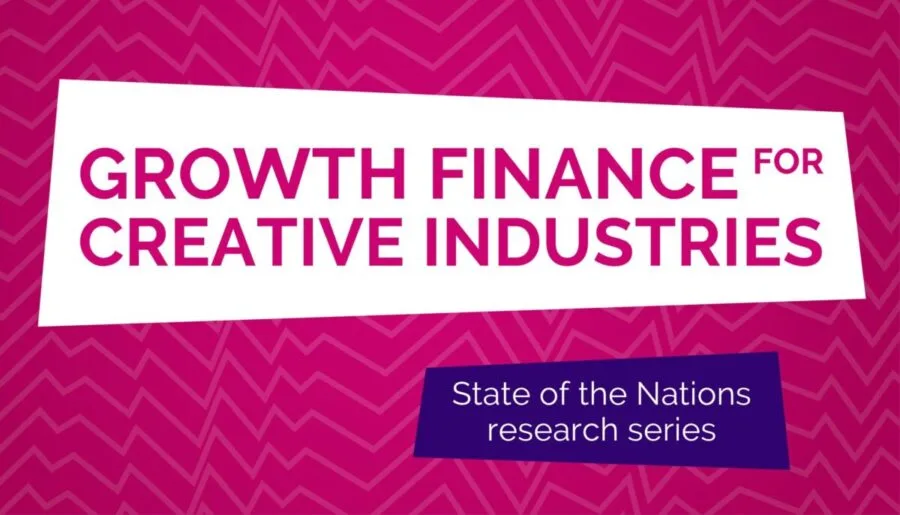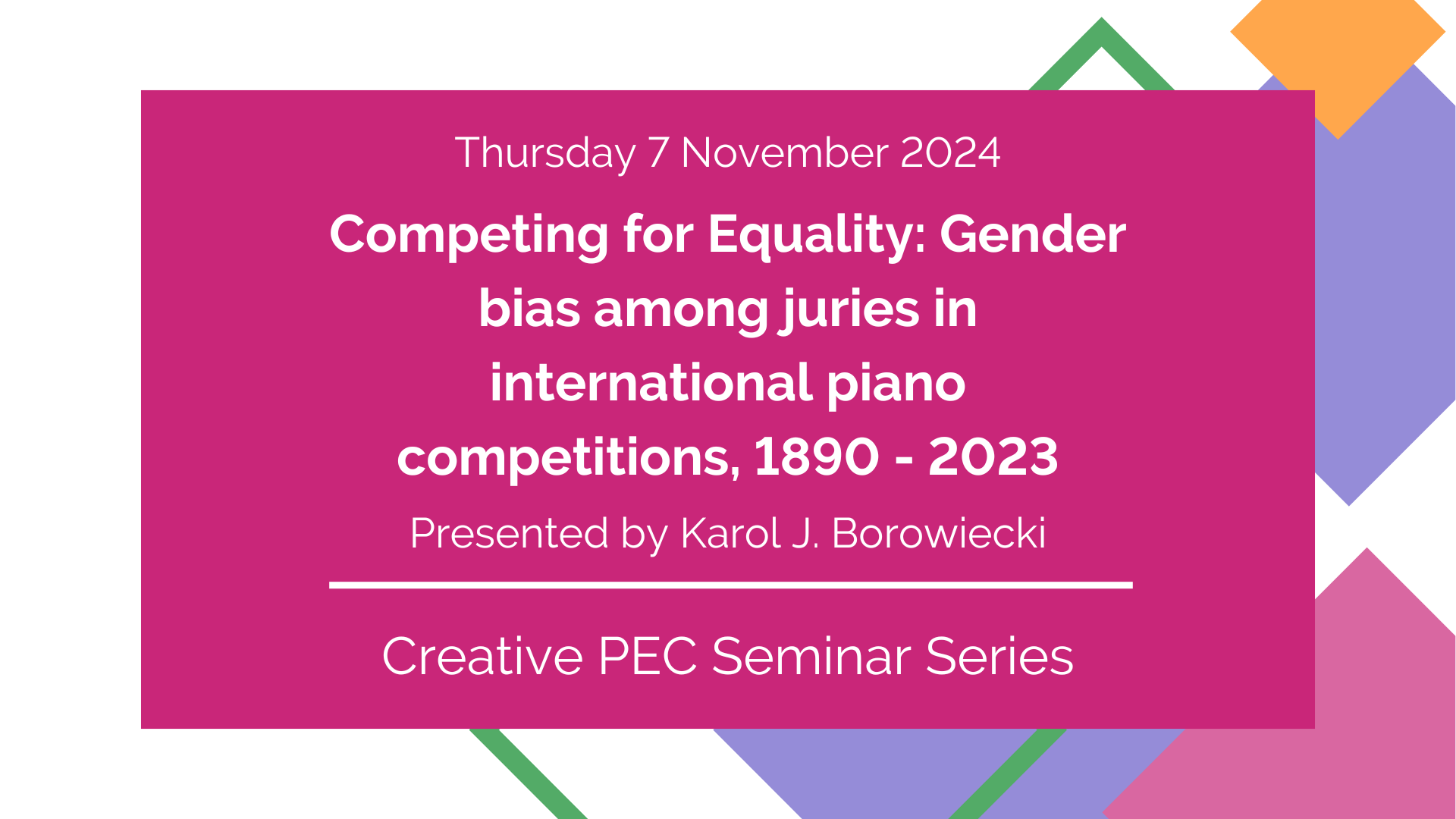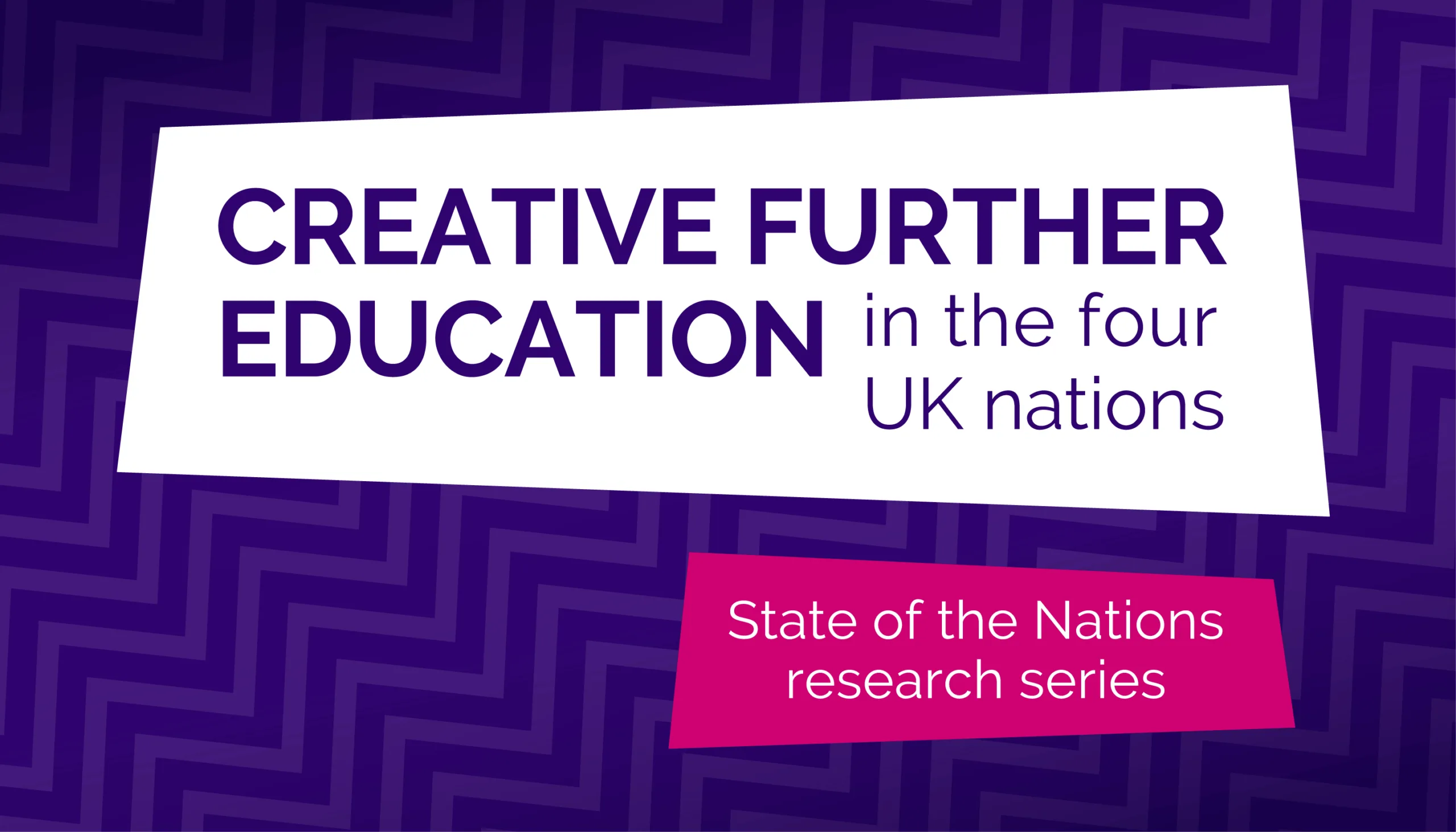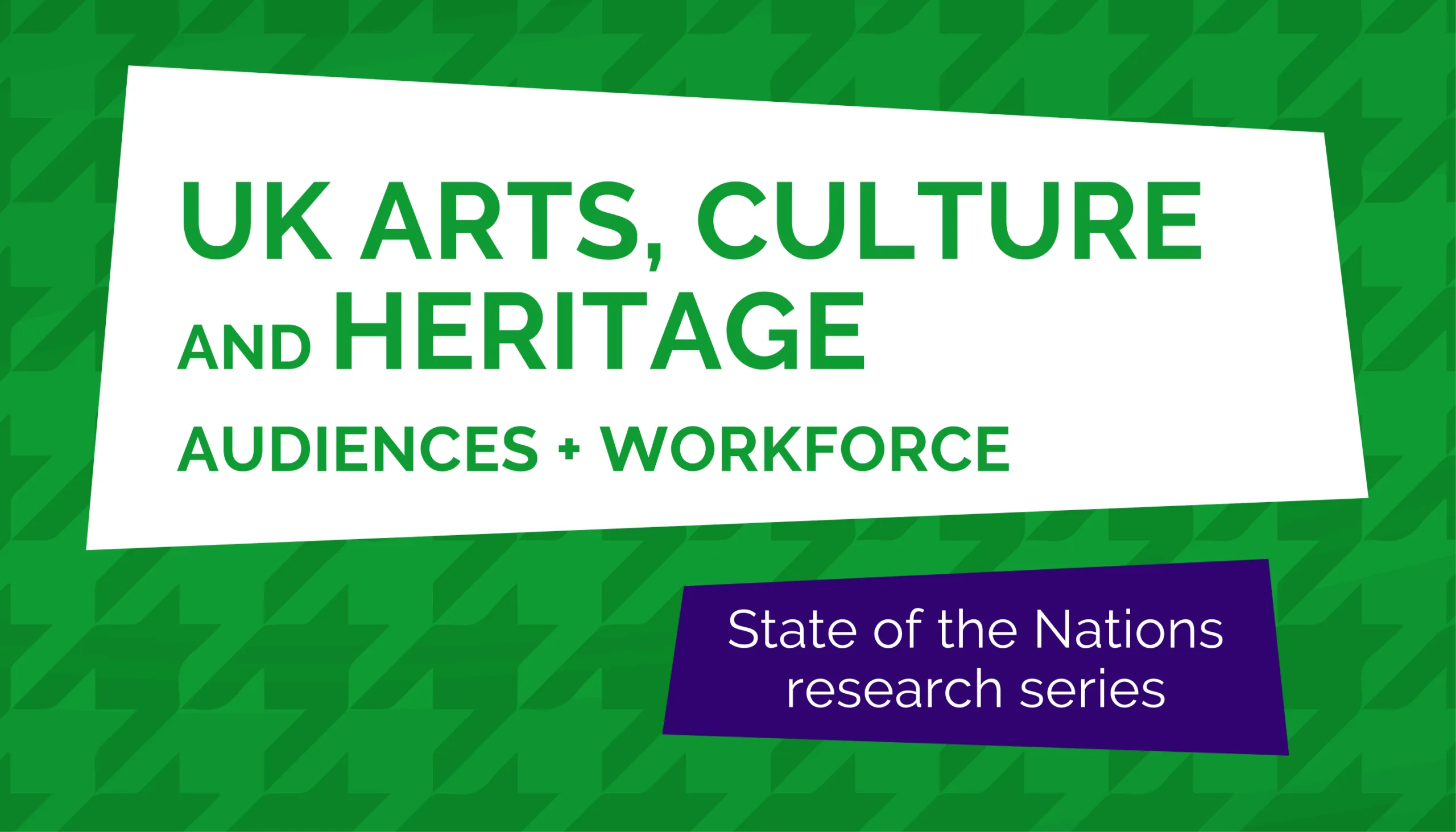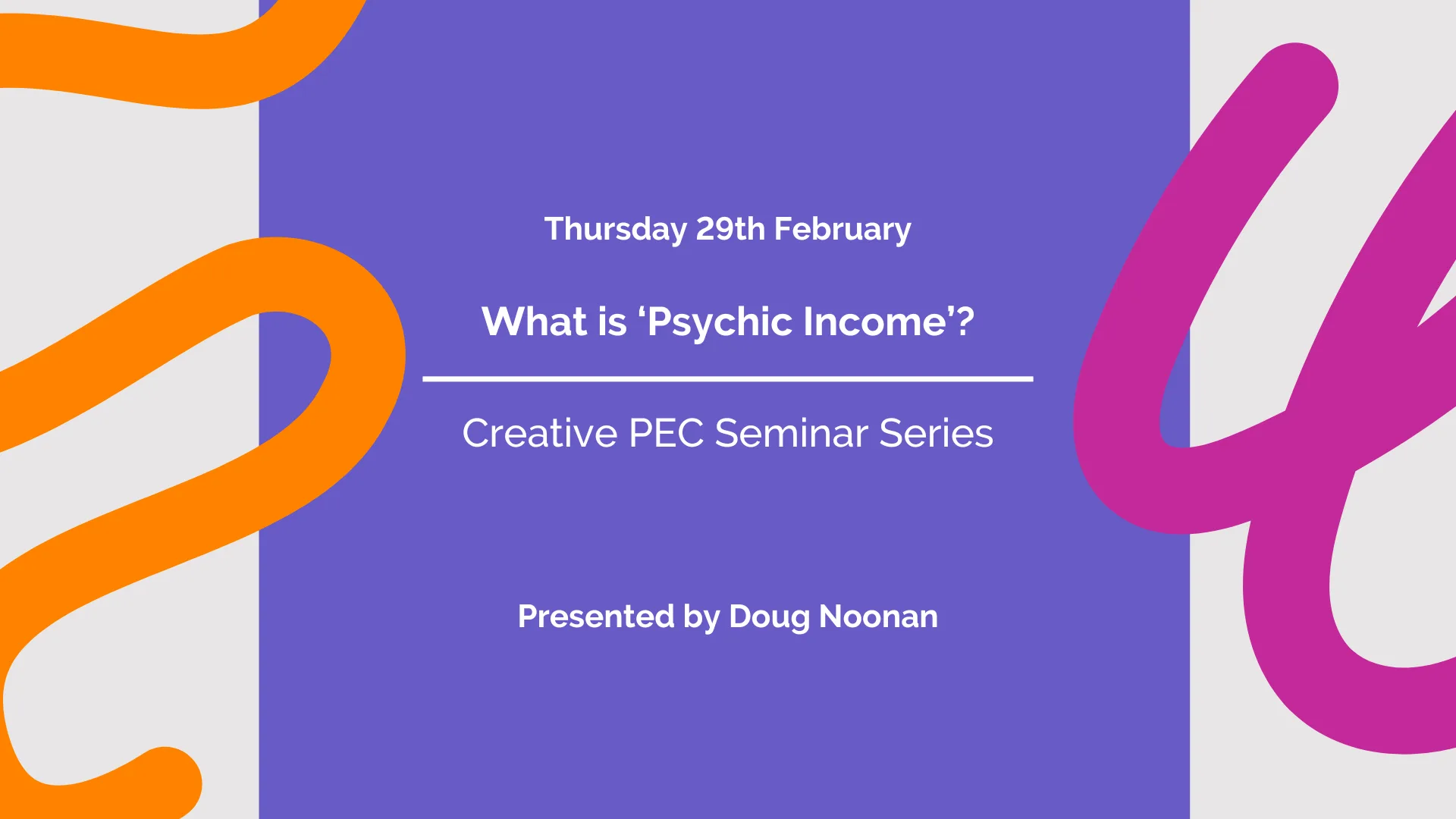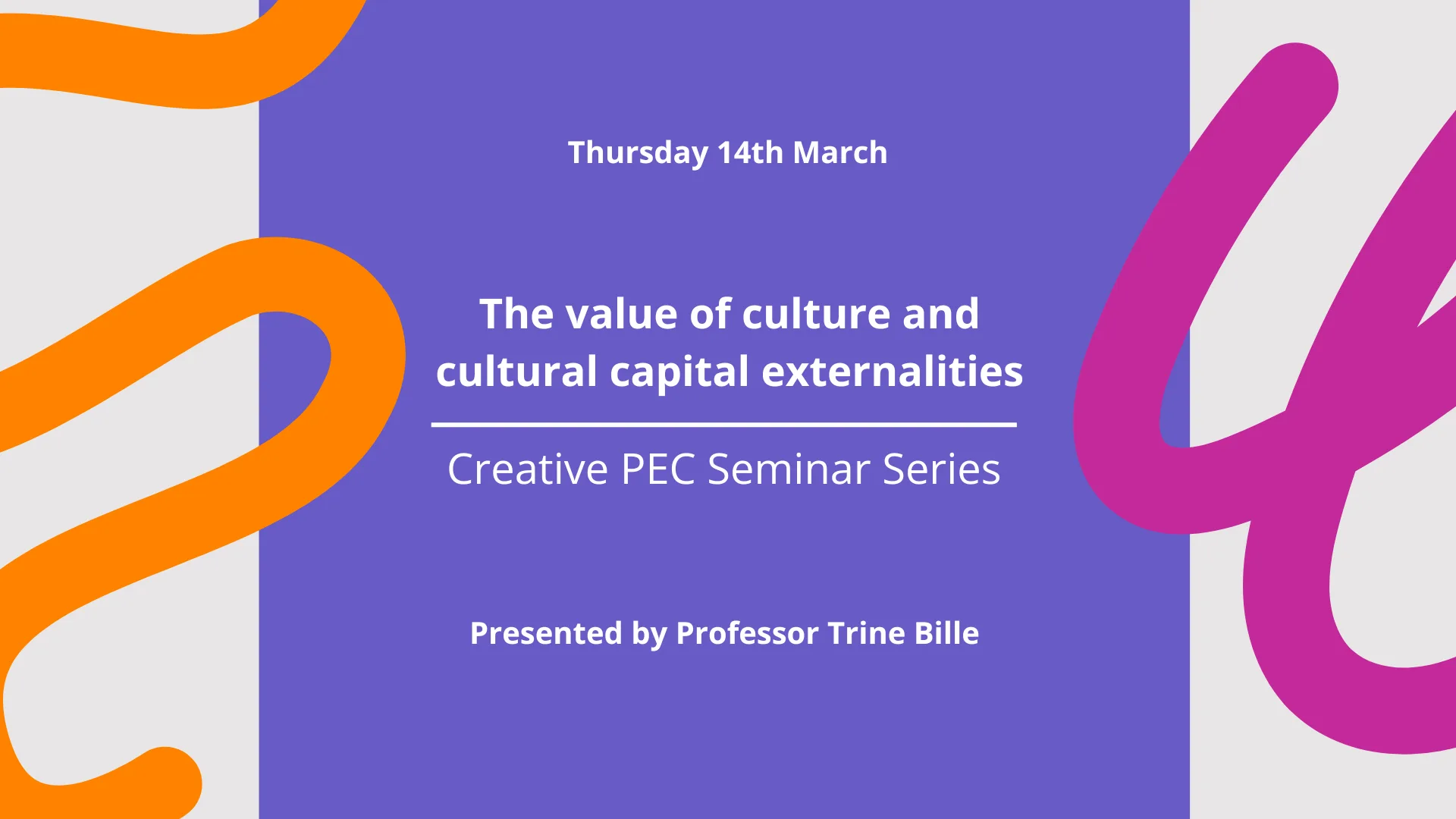Join creative industry policy makers, researchers and practitioners from around the UK for a day of lightning talks, panel discussions, keynotes and performances.
The State of Creativity will be held at the BFI building in the iconic South Bank Centre. You will get to listen to leading thinkers from across the country and internationally share the latest findings on key themes such as inclusive growth, R&D, skills, education, and createch.
We’ll reflect on policy changes over the last 25 years – from the era of cool Britannia to today – and ask, where next for the creative industries?
Presented by the Creative Industries Policy and Evidence Centre (PEC), funded by the AHRC, this networking opportunity will set out the next stage of the journey for the PEC.
We invite you to share your reflections on how the sector can best work together to ensure the UK remains a world leader in the creative industries, leading innovation, with a view to growth, inclusion and sustainability. The day will include the launch of a major new report on the research and policy landscape of the creative sector.
Thanks to generous support from the AHRC, attendance is free, however places are strictly limited due to venue capacity.
Speakers




Speaker Biographies
Tom Adeyoola
Tom is a technology entrepreneur passionate about disruptive technology for societal and climate good. He was CEO and Founder of acquired apparel technology scale-up Metail (2008-2019).
He is currently a cofounder of nonprofits Extend Ventures, which aims to diversify access to finance for underrepresented founders through data and research, and the cross-school alumni Capital Angel Network. He also serves as Non-Exec Director for zero carbon monitoring consultancy Verco and environmental behavioural change start-up ‘Do Nation’ and previously served on the board of the revolutionary women’s personal wellness scale-up Elvie.
Hasan Bakhshi
Hasan is Director of the Creative Industries Policy and Evidence Centre, a Nesta-led, AHRC-funded research consortium of ten universities, charged with improving the evidence base for policies to support the UK’s creative industries.
Prior to Nesta, Hasan worked as Executive Director at Lehman Brothers, as Deputy Chief Economist at the Foreign and Commonwealth Office and as an economist at the Bank of England. He has published widely in academic journals and policy publications on topics ranging from technological progress and economic growth to the economics of the creative and cultural sector.
Sir Peter Bazalgette
Sir Peter Bazalgette is Senior Independent Director on the board of Saga and also chairs LoveCrafts. From 2016 to 2022 he chaired ITV, and previously served on the board of Channel 4.
He led a 2017 independent review into the UK’s creative industries and now serves as co-Chair of the Creative Industries Council. He also chairs the Council of the Royal College of Art. From 2013 until 2017 he chaired Arts Council England.
Sir Peter has also been a non-executive board member of UK Research and Innovation (UKRI) and currently chairs the Baillie Gifford Non-Fiction Book Prize Trustees. He’s currently on the board of Department for Education and previously performed the same role for DCMS.
Leonie Bell, Director of V&A Dundee at Scotland’s Design Museum
Leonie Bell is the Director of V&A Dundee Scotland’s Design Museum. As Director, she is responsible for leading the organisation from its spectacular home in Dundee’s reimagined waterfront, for delivering the museum’s vision to inspire and empower through design, and for championing design and designers and the infinite possibilities they bring as catalysts of creativity and change
Leonie is also an Honorary Professor of Design at the University of Dundee’s Duncan of Jordanstone College of Art & Design, a Design Economy Ambassador for the Design Council, a trustee of the Edinburgh International Festival and a member of The Empress Theophano Price Advisory Council.
Baroness Jane Bonham-Carter, House of Lords
Jane’s original career was in television, first in New York working for NBC. Back in the UK she joined the BBC where she worked on Panorama and Newsnight, among other programmes. She then moved to Channel 4 where she was programme Editor of A Week In Politics. In 1996 she became the Liberal Democrats’ Director of Communications, a role she held through the 1997 election before returning to a career in television at Brook Lapping Productions. In 2004 she entered the House of Lords as a Liberal Democrat Peer.
She was a member of the House of Lords Select Committee on BBC Charter Review, 2005–06, on Communications, 2007–10, on Communications and Digital 2015 – 19
Tracy Brabin, Mayor of West Yorkshire
Tracy Brabin is a British Labour and Co-operative politician who was elected as the first Mayor of West Yorkshire, and the first ever woman Metro Mayor in England, in May 2021.
Prior to her election as Mayor, Tracy was the Member of Parliament for Batley and Spen from 2016 until 2021. As MP, she held appointments as Shadow Early Years Minister, Shadow Secretary of State for Digital, Culture, Media and Sport, and Shadow Minister for Cultural Industries.
Born in Batley, Tracy was an actor and screenwriter prior to entering politics, appearing in several British soap operas and writing for several television series. Tracy now lives in Kirklees, West Yorkshire. She has a husband and two daughters, all of whom work in the creative industries.
Ruth Claxton, Eastside Projects
Ruth is an Artist who’s work has been presented nationally & internationally. She is a founding Director of Eastside Projects, an artist-run multiverse in Birmingham, which she co-leads with Artist Curator Gavin Wade. As well as co-curating exhibitions and producing public artworks she has developed infrastructure at various scales to support artists including Extra Ordinary People, The Syllabus & the Birmingham Art Map. She is currently making a radio station with artist Abbas Zahedi and children from Chandos Primary School in Birmingham.
In 2014 she initiated research that led to the Birmingham Production Space proposal. Many of these ideas were realised through STEAMhouse, a centre for creative & collaborative innovation, developed in partnership with Birmingham City University which opened in 2018.
Rishi Coupland, Head of Research and Insight at the BFI
Rishi Coupland is a strategist and leader with over twenty years’ experience in delivering research, innovation and strategic programmes. At the BFI, Rishi leads the Research and Statistics Unit and is responsible for the National Lottery Research Fund and National Lottery Innovation Challenge Fund.
Prior to this, he held the roles of Head of Data Intelligence at the National Theatre, where he launched and led the sector flagship Data Studio, Head of Audience Strategy (National Theatre), Marketing Services Manager (Southbank Centre), and Senior Producer (Buzz-erk Productions).
Rishi began his career as a technologist and engineer with multinational companies in locations across the UK and Europe. In 2017 Rishi was awarded a Clore Fellowship, and he is a board member of London Arts and Health.
Neil Cowling, Fresh Air Production
Neil Cowling is the founder of Fresh Air Production – the UK’s leading producer of podcasts for brands and businesses. As a former BBC radio producer, Neil moved Fresh Air into podcasting five years ago and has focused on audio content for major clients including WWF, IUCN, Hyundai, National Grid and Kew Gardens.
Eliza Easton, Creative Industries Policy and Evidence Centre
Eliza Easton is Deputy Director for the Creative Industries Policy and Evidence Centre led by Nesta. Eliza works with the researchers from across the Centre to analyse and develop policies for the creative industries, and then works with policy-makers to see those policies enacted. Eliza also authors her own research, most recently on the changing levels of arts funding in England.
Prior to joining Nesta, Eliza was part of the founding team of the Creative Industries Federation, a UK membership body for the creative industries. She headed up the research team at the Federation and worked across a number of policy areas including trade, funding, skills and immigration.
Giorgio Fazio, Newcastle University
Professor Giorgio Fazio is an applied economist with expertise in macroeconomics, international and regional economics, and the economics of the cultural and creative industries.
In these areas, he has published in leading international journals, such as, among others, Journal of Money, Credit and Banking, Journal of International Money and Finance, Journal of Development Economics, Journal of Banking and Finance, Regional Studies, Journal of Regional Science, International Review of Regional Science, Growth and Change Technological Forecasting and Social Change, and the Journal of Cultural Economics.
Giorgio is Chair of Macroeconomics and leads the Creative PEC work on the internationalisation of the creative industries from Newcastle University.
Gerwyn Evans, Deputy Director of Creative Wales.
Creative Wales is a Welsh Government internal agency that supports the development of the fast-growing creative industry in Wales. They focus on developing and promoting growth across a wealth of Creative Sectors including Film and TV, Animation, Games, Music, Comedy and Publishing; positioning Wales as one of the best places in the world for creative businesses to thrive
Lesley Giles, Director of Work Advance
Lesley undertakes research and analysis and provides policy advice around workplace innovation, skills and the world of work. Prior to this, Lesley was Director at the Work Foundation where she managed a work programme seeking to champion and advance Good Work.
In addition, Lesley was Deputy Director and Company Secretary at the UK Commission for Employment and Skills, where she provided guidance on skills and employment issues to Industry and Government. She is a Fellow of the Royal Society of Arts and a member of the Chartered Institute for Personnel and Development.
Bernard Hay, Head of Research and Design Practice at the Design Council,
Bernard Hay is a researcher, curator and educator working across contemporary design. He is Head of Research and Design Practice at the Design Council, the UK’s national strategic advisor on design.
Previously he worked at the Design Museum, where he helped to establish the Future Observatory programme. His current projects include Design Economy – a national programme of research into the social, environmental and economic value of design – and the Design for Planet Fellowship.
Since 2019 he is an Associate Lecturer in critical theory and social innovation at University of the Arts London. He is a fellow of the RSA.
Martin Kretschmer, Professor of Intellectual Property Law at the University of Glasgow, and Director of CREATe
CREATe is the UK Copyright and Creative Economy Centre. He is leading the work stream on Intellectual Property and Regulation for the AHRC Creative Industries Policy & Evidence Centre (PEC). Martin has authored numerous studies at the interface of law, social science and digital technology, including for the UK Cabinet Office, UK Intellectual Property Office, European Commission, European Parliament and research councils AHRC, ESRC, EPSRC.
Ruth McElroy
Ruth McElroy is Professor of Creative Industries and Head of the School of Arts, Culture and Languages at Bangor University. Ruth has collaborated with industry and academics on several UKRI research and innovation projects including Audience of the Future (Wallace & Gromit: the Big Fix Up), Clwstwr (one of 9 creative cluster innovation projects aimed at the bilingual Welsh screen industries), and Media Cymru, a Strength in Places programme of more than 20 consortium partners. Ruth is Chair of Ffilm Cymru Wales (the film development agency for film in Wales) and is Ofcom Content Board Member for Wales.
Ruth’s academic research examines policy, production and cultural representation in film and TV. Her most recent book is Producing British Television Drama: Local production in a Global Era (with with Caitriona Noonan, Palgrave 2019).
Caroline Meaby
Caroline Meaby is a cultural and creative industries consultant, currently studying full time for a MSc in Organisational Psychology at Birkbeck, University of London.
Caroline has 25 years experience in the creative industries, having started her career as an entertainment news journalist before ten years as a producer at the BBC, on shows such as Blue Peter. Most recently, Caroline was Director, Arts Network at the British Council, overseeing the work of 300 specialist arts and creative industry colleagues around the world and she also led the British Council Arts External Relations team, and co-chaired the Creative Europe Desk UK Partnership Board alongside the BFI.
Caroline is interim chair of ACE NPO Studio 3 Arts in Barking. She was born and bred in East London and is of white British, Indian and Malawian heritage.
Lord Neil Mendoza, Commissioner for Cultural Recovery and Renewal and Provost of Oriel College, Oxford University.
In 2017 Neil led two government reviews, ‘The Mendoza Review: an independent review of museums in England’ and a separate tailored review of the museums sponsored by DCMS.
He started working life as a banker at JP Morgan in New York before moving to film finance. He co-founded the pioneering publishing agency, Forward, later sold to WPP. He has spent much of his career as an entrepreneur in a number of industry sectors including film, design, marketing and technology. He is a publishing consultant to watch company, Patek Philippe.
Neil is on the board of Meira GTx, a gene therapeutics company, listed on Nasdaq. He is also Chair of The Landmark Trust and Chair of the Illuminated River Foundation.
Chris Michaels, Director, Chris Michaels Digital Advisory
Chris is an advisor, consultant and researcher in the Cultural and Creative Industries.
He is Director of Digital Strategy at Bolton & Quinn, a communications consultancy; Senior Associate for Human Economics, a strategy and economics consultancy; Sr. Advisor to Tesseract Collective, a digital IP company and Advisor to the Haus Der Kunst in Munich.
He is a Trustee of English Heritage, The Audience Agency and The Collections Trust. He was Director of Digital, Communications and Technology at the National Gallery from 2017-22, a Sr. Visiting Research Fellow at King’s College London and a Creative Industries Fellow at the AHRC. He was named one of the top 10 Museum Influencers in 2022.
Professor Paul Moore
Professor Moore joined the University of Ulster in 1999 and has since been active in the development of the creative arts/industries policy in the university. He is now Director of Future Screens NI, the AHRC funded creative industries cluster for NI, and is a Co-Director of Ulster’s Creative Industries Institute (CII).
His research is focused on both the creative industries and the ways in which theory and practice can be brought together in research, training and education. Most recently he has been involved in various arts data research projects with national bodies such as Nesta in the UK.
Rehana Mughal
Rehana Mughal is Director of the Creative Economy Global Programme at the British Council, she leads a globally dispersed team to deliver projects that focus on policy, research, advocacy, and on leadership development for creative professionals.
Prior to leading the creative economy portfolio, Rehana held the post of Director Arts, British Council, China, and Cultural Counsellor, at the Cultural and Education Section of the British Embassy in Beijing. Rehana spearheaded the digital delivery of arts work across China and reached millions of people during the height of the pandemic and created new opportunities for over 300 arts organisations.
John Newbigin OBE
John Newbigin is co-founder and first Chair of Creative England (from 2011 to 2018), a public/private partnership that invests in creative content businesses and digital technology.
As Special Advisor to the UK Minister for Culture, Rt Hon Chris Smith MP, he was part of the team that developed the UK government’s first policies for the creative industries in the 1990s. He is London Mayor Sadiq Khan’s Ambassador for the Creative Industries and a Board member of the London Economic Action Partnership and the Mayor’s Cultural Leadership Board for London.
He was awarded an OBE for “services to creative industries and the arts” in the Queen’s 2015 New Years Honours List.
Caroline Norbury OBE, Chief Executive of Creative UK
Creative UK is the independent network for the UK’s Creative Industries working to support and invest in creative talent and businesses, and unite the UK’s creative industries.
Caroline sits on the Creative Industries Council and chairs the Investment for Growth sub-group of the Council. She is a non-executive director of Crowdfunder, the UK’s largest rewards-based crowdfunding platform; a member of BAFTA and the Royal Society of Arts and a trustee for the PRS Foundation, a charity supporting new music and talent.
She was awarded an MBE in 2012 for services to the film industry, and has recently been awarded an OBE for her leadership and advocacy in shaping the creative sector’s response to the Covid-19 pandemic.
Sara Louise Pepper
Gyd-Gyfarwyddwr ar yr Uned Economi Greadigol ym Mhrifysgol Caerdydd
Mae Sara’n Gyd-Gyfarwyddwr ar yr Uned Economi Greadigol ym Mhrifysgol Caerdydd. Ei rôl yw cynnig arweiniad a chyfeiriad strategol i’r Uned a’r tîm. Ar hyn o bryd mae hyn yn cynnwys mentrau ymchwil ac ymgysylltu fel y rhwydwaith dinas greadigol Caerdydd Creadigol, Clwstwr, prosiect Ymchwil a Datblygu gwerth £9 miliwn sy’n hybu arloesedd yn economi Cymru, a Media Cymru, rhaglen £50 miliwn a ariennir gan Strength in Places UKRI.
Ar gyfer Media Cymru bydd gwaith Sara’n canolbwyntio ar ddatblygiad a chyflawniad strategol y rhaglen gan gynnwys llywodraethu, rheoli, syniadaeth arloesi, gweithredu ac allbynnau, gofodau, partneriaethau a chydweithrediadau rhyngwladol.
Co-Director of the Creative Economy Unit at Cardiff University
Sara works on research and engagement initiatives such as creative city network Creative Cardiff, Clwstwr a £9 million R&D project promoting innovation in the Welsh economy and Media Cymru a £50 million UKRI Strength in Places funded programme. For Media Cymru Sara’s work will focus on the strategic development and delivery of the programme including governance, management, innovation ideation, implementation and outputs, spaces, partnerships and international collaborations.
Previously Sara has held a variety of posts from producer to project manager for organisations such as the Southbank Centre, the Wales Millennium Centre, the Riverfront Theatre, Hull University School of Arts & New Media & the Sydney Olympic Games 2000. Sara is currently a member National Trust Wales Advisory Board.
Lara Ratnaraja, Independent Cultural Consultant
Lara is a Cultural Consultant who specialises in diversity, innovation, leadership, collaboration, and cultural policy implementation within HE, cultural and digital sectors. She co-created the Hello Culture event series (how cultural and digital technology intersects), and is planning a new series in Yorkshire from March 2023.
With Helga Henry, she co-produces a series of leadership programmes: RE:Present, ASTONish, which supported the development of cultural leaders from diverse backgrounds so that the cultural ecology of Birmingham, better reflects its changing demographic; AD:Vantage which placed the vantage point of d/Deaf, neurodivergent and disabled creative practitioners at the heart of leadership and EmPOWer for OPUS; that supported diverse Neighbourhood Producers who were part the Commonwealth Games Festival Sites.
Lara is on the board of Derby Theatre, Vivid Projects and Coventry Biennial and the Advisory Group for SHOUT Festival. She is on the UK Council for Creative UK and the Equality Monitoring Group for Arts Council Wales.
Harman Sagger
Harman Sagger is Head Economist for Arts, Heritage and Tourism (AHT) at DCMS and leads a team of analysts within the AHT directorate. Harman led the analyst team working on DCMS’s Cultural Recovery Fund (CRF) and currently leads the Cultural and Heritage Capital Programme, which was nominated for a Civil Service Award.
Harman returned to DCMS in 2017 after 2 years as the British Film Institute’s Head of Economics. In his previous role at DCMS, he was at the heart of embedding a rigorous evidence-based approach within DCMS. He has previously worked for HM Treasury and HM Revenue and Customs, working on various areas, including emerging markets, globalisation, productivity, road charging and environmental taxes.
Fran Sanderson, Director, Arts & Culture Investments and Programmes, Nesta
Fran Sanderson has been at Nesta for six years and has overseen the development of Arts & Culture Finance, which manages over £30m of impact capital on behalf of eight funders, including Nesta.
She has led on various projects including Nesta’s involvement in the RSC’s Dream project, for the Industrial Strategy’s Audience of the Future programme; Amplified, a grant and structured support programme helping cultural and creative organisations to use digital ideas to generate social impact; a Creative Immersive Mental Health fellowship programme with StoryFutures looking at the role of creatives in engaging users; and Alternarratives, a prize designed to bring the short story form into the 21st century with the aim of reigniting interest in reading for pleasure among young people.
Josh Siepel, Senior Lecturer at the Science Policy Research Unit (SPRU) at the University of Sussex Business School.
Josh leads the Creative PEC’s work on Creative Clusters, Innovation and R&D, and Access to Finance. His research links together policy-relevant issues involving creative industries, clusters, skills, innovation, entrepreneurship and finance.
He was the lead author of the PEC Creative Radar reports and has also published research for the PEC on rural creative microclusters, R&D in Createch businesses, and access to finance for innovators in the creative industries.
He has served on multiple advisory boards and currently sits on the Advisory Board for the DCMS Create Growth Programme. He has a BS in genetics from Texas A&M University and an MSc and DPhil from the University of Sussex, where he was a Marshall Scholar.
Robert Specterman-Green, Director for Media and Creative Industries, DCMS
Robert Specterman-Green joined the Civil Service through the Fast Stream in 2001. He is currently Director for Media and Creative Industries in the Department for Culture, Media and Sport. Prior to moving to DCMS in January 2019, Robert worked in the Department for Work and Pensions: as Head of EU and International Affairs; then, as Principal Private Secretary to five different Secretaries of State; and, latterly, Director for Ministers, Governance and Strategy. Prior to these roles, Robert worked in both the European Commission and, for 10 years, in HM Treasury, where he covered a range of European economic policy issues and public spending control.
Love Ssega, Artist-In-Residence with Philharmonia Orchestra
Love Ssega is a musician, producer and performer, currently Artist-In-Residence with Philharmonia Orchestra. He has been commissioned to create site-specific performances and work for the National Gallery, Serpentine Pavillion and MoMA PS1, New York and his environmentally-focussed work was shown at United Nations COP26 and also featured by The New York Times for Climate Forward.
Love Ssega’s latest arts and air pollution awareness project, LIVE + BREATHE, galvanised Black and Brown community groups in South London for creative climate action. Love Ssega was awarded Arts Foundation Music For Change Fellowship in 2022 and is a Trustee of both Shadwell Opera and Brian Eno-led climate charity EarthPercent.
Tolu Stedford
Tolu Stedford is a producer and Co-founder of Story Compound I,s a creative film, TV and immersive media production company and consultancy developing a talent pipeline with an emphasis on the global majority, including the intersections of disability, neurodiversity, gender and sexual orientation, plugging the skills gap for creative companies, and accelerating commission-ready IP to help UK film, TV and immersive media reach global audiences.
As interim CEO of the Independent Film Trust, Tolu created the Power Talks series, engaging producers, executives and commissioners in productive conversation around increasing diversity and representation in UK film and TV. Tolu, with Charlotte Knowles and Adquanita Curtis, created the Creative Corridor scheme, born from her years of experience she formulated a tangible solution to helping diverse narratives and talent break into the mainstream.
Carys Taylor, Director of Albert
Albert is the home of sustainability for the TV and film industry. Prior to taking up the role, Carys was at National Grid where she worked on solutions to decarbonise transport, the biggest contributor to UK carbon emissions. She is no stranger to the TV industry however, having also worked at BBC Studios as an advisor to Tim Davie, advocating for the UK creative sector.
Carys also spent some time working in UK Parliament and studied international politics where she examined the role of media in shaping international attitudes to debates for her dissertation.
Bruce Tether
Bruce Tether is Professor of Innovation Management and Strategy at Manchester Business School (MBS) within the University of Manchester, a position he has held since October 2011. Prior to this he was Professor of Design and Innovation at Imperial College Business School at Imperial College in London. There he was the leader of the Design-London research team. Design London was a joint venture between Imperial College and the Royal College of Art (RCA).
More recently, Bruce has led an major European FP7 project on the creative industries and has served as the research director of the Creative Industries Policy and Evidence Centre. Originally trained as an economic geographer, he retains a strong interest in the geographical distribution of activities, and therefore “levelling up”.
Alison Tickell, CEO of Julie’s Bicycle
Alison established Julie’s Bicycle in 2007 as a non-profit company helping the music industry reduce its environmental impacts and develop new thinking in tune with global environmental challenges. Julie’s Bicycle has since extended its remit to the full performing and visual arts communities, heritage and wider creative and cultural policy communities.
Originally trained as a cellist, Alison worked with seminal jazz improviser and teacher John Stevens. She worked for many years at Community Music and at Creative and Cultural Skills where she established the National Skills Academy.
Past Events
State of the Nations Report Launch: Migration in UK Creative Occupations and Industries
Tuesday 10 June 2025 | 12-1pm (GMT) | Online Event
State of the Nations Report Launch: Arts, Culture and Heritage: Recent Trends in UK Workforce and Engagement in England
Report launch for our State of the Nations series On Wednesday 7 May 2025 we launched our new State …
Seminar Series: Digital Culture: Emerging trends in museums online
Thursday 5th December 2024 | 15:00 GMT Hear from Professor Trilce Navarrete who will discuss her on…
Seminar Series: The UGC Revolution: Transforming China’s Cultural and Creative Industries
Friday 6 December 2024 | 14:00 GMT Anthony Fung's presentation explores the concept of "digital lab…
State of the Nations Report launch: Foreign Direct Investment in the UK’s Creative Industries
Wednesday 20 November 2024 | 12noon | Online via Zoom. Join us for the launch of the next report in…
State of the Nations Report launch: Growth Finance for Creative Industries
Wednesday 16th October 2024 | 12noon | Online via Zoom. Join us for the launch of our fifth report …
Seminar Series: “The cost of undoing Europe”: Brexit and the UK textile and the apparel industry
Thursday 3rd October 2024 | 15:00 BST Hear from Professor Simona Iammarino who will be presenting he…
Seminar Series: Competing for Equality: Gender Bias Among Juries in International Piano Competitions, 1890-2023
Karol J. Borowiecki presents his latest research about gender bias among juries in the universe of i…
Report launch: Creative Education in the Four Nations
Join us at the launch of our fourth report in the State of the Nations series
Report launch: UK Arts, Culture and Heritage – Audiences and Workforce
Join us at the launch of our third report in the State of the Nations series
Seminar Series: What is ‘Psychic Income?’
Hear from Professor Doug Noonan about his latest research measuring 'Psychic Income', intangible imp…
Seminar Series: The value of culture and cultural capital externalities
Professor Trine Bille will be discussing a proposal that suggests that cultural policy should take i…
